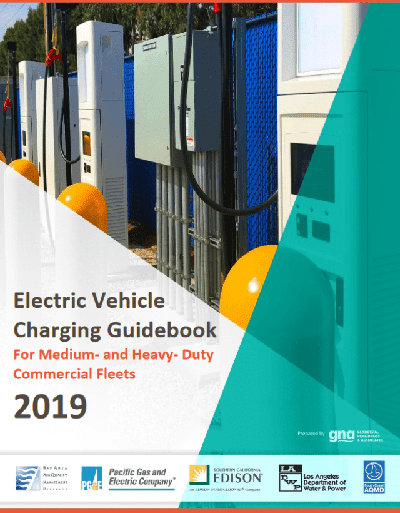
Electric Vehicle Charging Guidebook for Medium- and Heavy-Duty Commercial Fleets
Published September 2019
Client: Los Angeles Department of Water and Power, Southern California Edison, Pacific Gas and Electric, South Coast Air Quality Management District, and the Bay Area Air Quality Management District
Introduction
Fleet managers in California are navigating a mix of business opportunities and technology innovations as they consider adopting clean, sustainable fuels. The selection of clean medium-and heavy-duty vehicles is expanding, with a growing number of manufacturers providing battery-electric options now or in the next several years for a variety of applications. As battery-electric vehicle (BEV) technologies for these applications approach commercial readiness, there is a clear need for charging infrastructure that can provide cost-effective vehicle charging on a reliable schedule. The optimal charging solution is unique to each fleet and depends on a variety of factors.
This guidebook walks you, the fleet manager, through the key steps of selecting, installing, and maintaining a charging solution that meets your needs. The first section provides context for your new BEV charging operations by summarizing the basics of electricity as a vehicle “fuel” and the electrical grid as the supplier of that electricity. Subsequent sections walk you through the process of assessing your fleet’s charging needs, engaging with your utility during the design process, and securing the permits required to install your charging stations. Sample calculations, average costs, and key terms and definitions (indicated in italics and Key Terms boxes) are included with supporting graphics for your reference and use.
After reading this guidebook, you will be able to:
- Estimate your fleet’s baseline energy needs and charging time requirements
- Identify the charging equipment options that meet your fleet’s needs in terms of a physical interface, speed of charge, and cost.
- Develop charging station configurations that work with your facility’s existing space, support current and future operations, maximize equipment lifecycles, and control costs.
- Identify which entities to engage in your jurisdiction for project design, permitting, and construction.
- Discuss important details of your electric service and electricity price bands with your utility.
- Find funding opportunities to reduce your total project costs.
This guidebook has been designed to provide a comprehensive overview of the BEV charging station procurement process for managers of medium-and heavy-duty commercial fleets. As this guidebook makes clear, the information presented here is meant as a general reference with theoretical examples only. When developing your charging solution, it is critical that you consult your vehicle manufacturer, local utility, local jurisdiction, and other relevant entities in your business and area for project-specific guidance.
